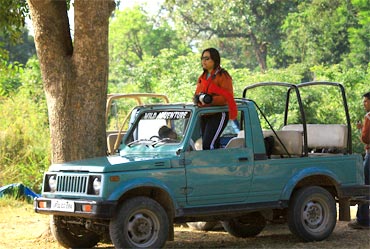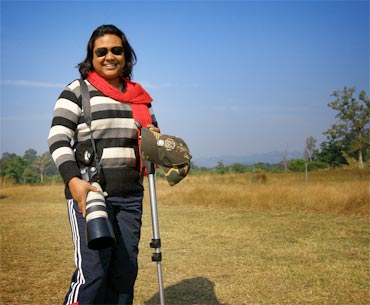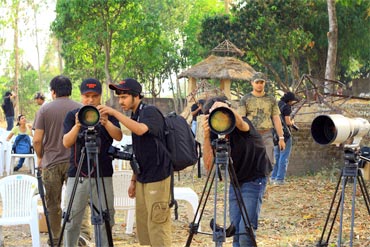
It was love affair that began when she was a little girl. She would join her father on expeditions into the jungles of Madhya Pradesh and take in the many sights and sounds of the wilderness. As the demands of school, college, business school and finally the corporate world took over, nature took a back seat. But sitting behind a desk in a shiny office building soon lost its appeal. After three short years, Kahini Ghosh Mehta decided to quit.
That was when she made a decision to return to her first love -- nature. Today, she runs Nature Wanderers, an organisation that organises excursions into Corbett National Park and other reserves. An avid photographer and naturalist, Kahini introduces the wonders of nature to city-slickers and encourages them to adopt more nature-friendly lifestyles.
Here in an interview with Shifra Menezes, she shares what it is like to be a naturalist and the highs and lows of following your passion:
The career of a naturalist is not one that many opt for. What got you interested in the field?
Nature and its various living forms is something that has fascinated me right since my childhood. I belong to a small town called Chhindwara in Madhya Pradesh that lies on the periphery of Pench Tiger Reserve and my connect with nature and wildlife began when I was very young.
My father's job was (one) that (involved spending) a lot of time in the forests of MP. I loved joining him on forest expeditions. When I came to Delhi and started working in a media house post doing my MBA, I was not happy. After spending three years in the closed confines of the corporate world, I decided to listen to my heart and started working in Corbett National Park in Uttrakhand which still remains my area of work.
Yes, the rewards and remuneration are not that high but the satisfaction you get is far beyond the money factor. At the end of the day, when you take a deep breath, your lungs are filled with the fresh and damp smell of the jungle which you can never find in a chaotic city like Delhi.
Tell us a bit about your education and professional career.
I did my schooling from the Scindia Kanya Vidyalaya in Gwalior and my graduation and postgraduation from GS College, Nagpur and the Indian Institute of Planning and Management, New Delhi. I have been actively involved in sports since my childhood and till my school days I used to represent SKV in national-level athletic events. Athletics is still deeply rooted somewhere in me...
Post my MBA, I started working for Planman Consulting and handled sales and marketing for Business & Economy magazine. It was a good experience to learn how to start a project from a scratch as I was involved with the magazine right from the inception stages.
How did your family react to your decision to quit the corporate world?
My husband was quite supportive because of multiple reasons. He always wanted me to be involved in stuff that would keep me happy. In addition, he is an equally keen naturalist and wildlife lover.
I got great support and encouragement from the elders including my father, in-laws and my brother. Yes, the home economics were destabilised but both my husband and I believe that to be professionally happy and satisfied you have to take risks in life. The higher the risk, the sweeter the success. Money is a criterion but sometimes it should take a backseat if you are seeing things from a long-term vision and perspective.

How did Nature Wanderers begin?
In 2006 or 2007, I was filming in Corbett for Wild Saga of Corbett -- Corbett's only travel film. The film was an initiative by Jolly Productions -- a set I had created for making short wildlife conservation related films. By this time we had also tied up with a campsite in Corbett and were actively working on various conservation projects and also towards the development of our camp.
Wild Saga of Corbett gave us a lot of recognition as people started contacting us for planning their visits to Corbett. In the beginning, we used to plan and even accompany people and groups for their visits to the jungle. Shivang (my husband) and I, along with my camp staff, hosted the guests and loved showing the beautiful wilderness of Corbett.
Our clientele was mixed -- from corporates, weekend travellers to photographers and serious wildlife enthusiasts. Our focus was conservation and even when corporates used to come for team-building activities we used sensitise them towards conservation issues through discussions, film screenings, etc.
By late 2008 we started organising nature workshops in Corbett and Shivang, being a wonderful wildlife photographer (a hobby cum profession that he has been pursuing for the last five to six years), also shared tips on how to photograph nature and its subjects. These workshops were a mix of fun, learning and such events started exciting us a lot. We then joined hands with Canon India and started organising workshops in association with Canon.
In 2009, we came up with the concept of organising India's first live photography contest where participants would be given the opportunity to shoot in real-life wild conditions in a defined time frame, equipment set and the winners announced on the spot. Canon again supported us and the event was called 'Canon Wild , no forest can ever disappoint you.
In addition, it is very important to be humble and be open to sharing knowledge and information. Conservation of Indian wildlife has to be a collective effort, nothing can be done in isolation. It is important for budding naturalists, photographers and other wildlife professionals to realise this.

Are there any educational courses that you would recommend to budding naturalists?
If you plan your career as a naturalist well, you can have good education as a back-up. Courses in zoology and forestry offered by Wildlife Institute of India and Forest Research Institute can be handy.
Recently, the Taj group has also started training naturalists in association with CC Africa. However the actual training happens in the field and you mature with experience. Classroom training may not be sufficient as you have to spend time in the wild for practical experience.
Could you describe what a typical workday is like for you?
When I am at work in a forest, I get up very early in the morning. Do a short round of meditation for regaining my focus and calmness as that is must when you are on a safari. Offer a small prayer to the forest gods and set off my early morning ride in the forest latest by 6am.
During a workshop, I try to explain animal and bird behaviour along with park ecology to the participants during rides. Afternoon is sometimes reserved for a watchtower or a machchan visit where you can observe the forest activity closely.
Normally I don't get time to have a proper meal during the day so post the evening ride I have a heavy meal, take a dump of the photos taken during the day, clean my equipment and retire early.
During workshops, after dinner time is reserved for bonfire discussions with participants on issues related to conservation, photography and generic jungle stories.
What is the best part about your job? And the worst?
People say: You have an exciting job as you get to travel. But believe me it's not that easy. If I am conducting a workshop, for instance in Corbett, then for the 20 participants it may be an outing and a vacation but for the Nature Wanderers team its work and we work really hard to ensure that each of the participants should carry some wonderful wild memories and spread awareness about the wilderness of India in the bigger cities.
The challenging and exciting part is the constant endeavour on our part to bring in some freshness in our workshops. So we keep on including new sessions like I took a full session on tiger behaviour during a recent workshop in Bandhavgarh.
It's sometimes disappointing to see that in cities like Delhi, the awareness and compassion towards nature and wildlife is abysmal. People are so busy in the human rat race that they never think about nature. I would like to urge the urban population to be aware and sensitive about these issues. The best way is to travel, visit wildlife reserves and learn about these issues. As citizens of this planet, it's our role to contribute in some way so that even our children can enjoy the natural wealth of this beautiful planet.
During your travels and excursions, there must be quite a few unforgettable moments too?
Experiences are many, but I will never forget the torturous eight hours Shivang and I spent on a machchan in Corbett in the peak of summer in 2007. We had run out of drinking water and ironically we were surrounded with water (a river flowing right next to our machchan and a waterhole at our back).
A tiger was cooling himself in the river and we remained perched on this small machchan for eight long hours without any food and water, waiting for this tiger to come out in the open. The king had tried our patience and just refused to budge from his camouflaged location.
Finally we had to retreat and reached the nearest forest resthouse and gulped down gallons of water. The next day we found out that even after setting a record for sitting in that particular machchan, the tiger moved and came out in the open as soon as we left.
A fleet of vehicles saw this magnificent male patrolling the grassland minutes after our departure.
Do you enjoy photographing nature in all its glory? Are you always on the lookout for that one perfect wildlife photo? We are inviting you to send in interesting, unusual wildlife pics. Simply mail your photo (original photos only) to getahead@rediff.co.in with the subject 'My wildlife pic' and we'll feature the best right here on rediff.com! Don't forget to include a little info on the pics you send in too.